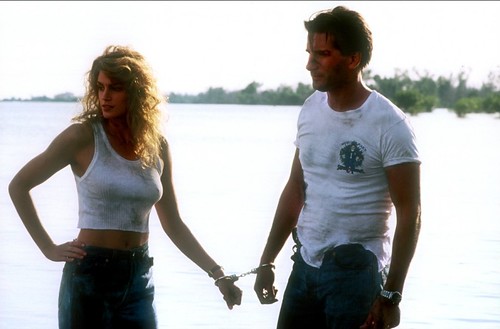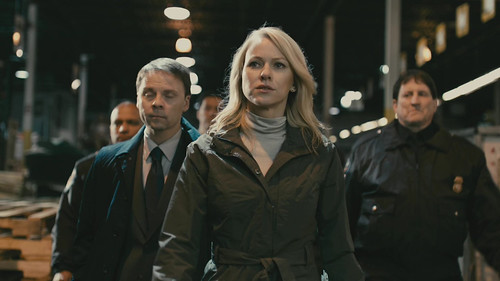Fair Game has a lot to live up to, and possibly live down. It’s a film about the Iraq War, and specifically about how the American government had no reason to start said war in the first place, and those never seem to turn out well. It’s based on the true story of Valerie Plame-Wilson, a CIA operative who was publically outed by Scooter Libby in an apparent attempt to distract from her husband’s criticisms of the war effort, which is an event so recent that the film has audience expectations to worry about. It’s not even the first major film about the subject, and follows Rod Lurie’s fictionalized but mostly solid Nothing But The Truth, starring Vera Farmiga and Kate Beckinsale. It’s a film by Doug Liman, whose track record isn’t exactly impeccable (he made The Bourne Identity, but he also made Jumper, so make of him what you will), and it’s the first pairing of Sean Penn and Naomi Watts since the Oscar-Nominated 21 Grams. And let’s not forget that the last time a big movie was named Fair Game, it stared Cindy Crawford as a computer hacker taking down those evil, evil Russians. “Dosvedanya, asshole” indeed.
Damn. That’s a lot of obstacles to overcome, but Fair Game does it with ease. It’s an excellent film, one of Liman’s best to date, and Sean Penn and Naomi Watts give just the kinds of spectacular performances that made them famous in the first place.

It may be an easy joke, but it’s also Fair Game.
Liman’s film, based on Valerie Plame Wilson’s memoir of the same title and her husband Joseph Wilson’s book The Policy of Truth, doesn’t try to make the Iraq conspiracy as badass as Paul Greengrass’s The Green Zone did, and as a result it doesn’t ring as false. The first half of the film follows Valerie (Naomi Watts) and her husband Joe (Sean Penn) as they become involved in the build-up to the Iraq War. Joe has experience as an ambassador in Africa, so the government sends him to confirm the sale of plutonium to Saddam Hussein. All he finds is evidence to the contrary. Meanwhile, Valerie works at the CIA to confirm that Iraqi scientists are indeed working on weapons of mass destruction. None of them are. But the war begins anyway, and many of the evidence the government presents to support their case contradicts the Wilson family’s findings. Valerie can’t speak out publically without compromising her active operations at the CIA, but Joe just can’t take it any longer and writes a very public article exposing the government’s lies.
The film shifts dramatically at this point from a fast-paced film about the world and its problems to a slower, character-driven film about Valerie and Joe. After Valerie’s classified position is exposed their problems cease to be about a world at war and instead their fragile relationship, the lies their friends have now uncovered and their plight with that singularly American tragedy: unwanted celebrity. But Liman’s film, from a very clever script adapted by Jex & John-Henry Butterworth, has a method to this madness. The shift in concept in tone might have derailed any other story, but of course derailing a story was the entire point of Valerie Plame-Wilson’s outing in the first place. The film, like the 24 news networks, ceases to care about events that affect the entire country (and not just ours) and instead focuses on these two – admittedly interesting – people and their personal problems. By the time you realize that you were so distracted by their daily foibles that you completely forgot about the actual war, the film is already making that very point. It’s not a very subtle point, but it’s well-articulated and cleverly presented.

CIA operatives always get the coolest coats, even in Doug Liman’s otherwise grounded Fair Game.
Liman’s movies always seem to emphasize character over plot (you might have noticed that Mr. and Mrs. Smith is missing a third act… then again, the characters were strong enough that you might not have). Fair Game is no exception, and even while the gears of war are turning away, Liman’s talented cast humanizes all the government spooks that other movies demonize or at least reduce to stereotypes. The guy whose bullshit report leads us to war? He’s not evil. His peers just describe him as a tool. Naomi Watts turns in a fine performance, measured and dignified, but unsurprisingly Sean Penn proves himself a standout. For once he plays a normal guy, accomplished but not (by cinematic standards) “great,” and he seems freed by this character who feels emotions but doesn’t feed off of them the way many of his roles do. In the best scene in the movie, Valerie is about to leave on a clandestine operation in the middle of the night. Joe confronts her and right in the middle of his big speech about how much he worries about her he stops himself, realizing that his feelings are a cliché. He wishes her luck and says goodnight. It’s a smart beat and a fine piece of acting.
Fair Game manages to be a film about the Iraq War without ever preaching (well, maybe just a little at the end). The point isn’t so much the war as the discourse: if you know who Valerie Plame-Wilson is, then you were successfully distracted. Ironically, the film condemns turning her into a media sensation but considers turning those same events into a feature film… well, fair game. But at least the movie is sly enough to pull it off. Fair Game is a smart movie; impeccably acted and worth watching. It’s out in theaters today.